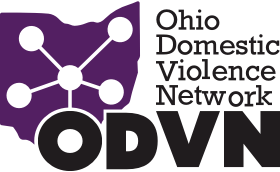The Center on Partner-Inflicted Brain Injury
Mission and Goals
This project of Ohio Domestic Violence Network provides statewide, national and international leadership to raise awareness on the emerging area of brain injury caused by domestic violence—including traumatic brain injury and brain injuries caused by strangulation or oxygen deprivation. The Center works to increase collaboration among systems and provide education, training, technical assistance, domestic violence program capacity building, research, reports, resource development, and promising practices for researchers and practitioners working with domestic violence victims impacted by brain injury.
What is a Head Injury?
A head injury is when there is a change to how your brain normally works due to a bump, blow or jolt to your head. Head injuries are also a result of the brain not getting the oxygen or blood it needs, like when someone chokes you or does something that disrupts your breathing. Sometimes the change is temporary and sometimes it is long-lasting.
How are Head Injuries Related to Domestic Violence?
Abusers target a person’s head, neck, or face more than anywhere else on the body. Head injuries may occur if your partner:
- Hits you in the face or head
- Puts their hands around your neck or tries to choke or strangle you
- Makes you fall and hit your head
- Shakes you severely
- Has done something that made you pass out, lose consciousness, or have trouble breathing
CARE Brain Injury Materials
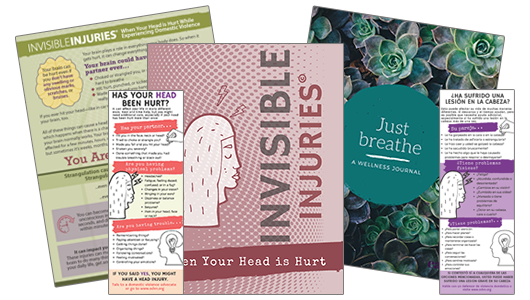
Education
- Post-Injury Education Card (English)
- Head Injury Education Card (Spanish)
- Brain Injury QR code
- Invisible Injuries Overview
- Invisible Injuries Booklet | English or Spanish
- Just Breathe | English or Spanish
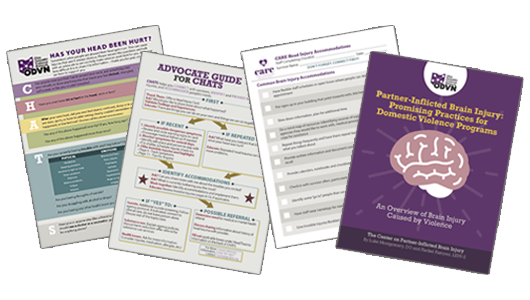
For Service Providers
More Information About Brain Injury Caused by Domestic Violence
For Survivors |
For People Working with DV Survivors |
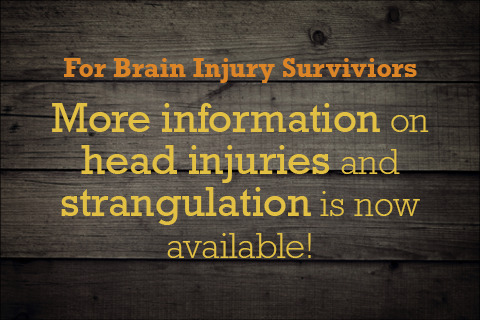 |
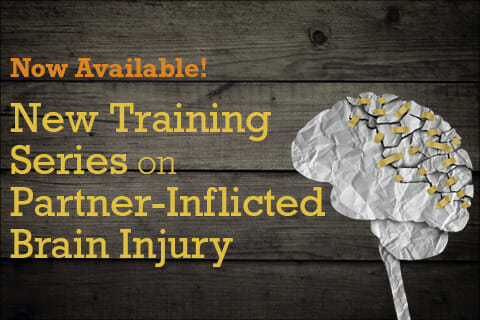 |
|
See the Brain Injury Survivors page for more information on head injuries and strangulation including 10 things to know and how to address challenges caused by head injuries. |
Launch our online portal, where you can watch our new 7-part series on Strangulation, Traumatic Brain Injury, and Domestic Violence. You will need to register for a free account if you don’t have one already. On the portal, to find the course, you can search for ‘Partner-Inflicted Brain Injury’. |
What We Do | Current Projects & Initiatives
Education, Training and Technical Assistance
Research and Reports

Assessing Needs of FQHCs to Become Partners in Chronic Brain Injury Detection & Rehabilitation among Domestic Violence Survivors
The goal of this project is to conduct a community needs assessment to better understand the opportunities to partner with federally qualified health center staff to optimize the identification, treatment, and rehabilitation of brain injury.
The key partners for this project are The Ohio State University and the Ohio Association of Community Health Centers and are funded by the Chronic Brain Injury Program at the Ohio State University.
Journal Articles and Reports
Additional information on peer-reviewed journal articles, the conceptualization of partner-inflicted brain injury, and reports detailing ODVN’s 2019 Action Plan to Improve Access and Attitude Change in Ohio, Findings from the Field on Brain Injury and Mental Health, and Evaluation of ODVN’s original brain injury, mental health and domestic violence project from years 2016-2019.
Domestic Violence Program Capacity Building
CARE focuses on connection through rapport and relationship building with survivors, acknowledges the complex impacts of domestic violence including brain injury, substance use, mental health challenges, and suicide, responds through providing accommodations, strategies, resources, and referrals, and evaluates service provision effectiveness by establishing a feedback loop with survivors relating to strategies developed to address their evolving needs and circumstances.
CARE is recognized as an evidence-based practice for domestic violence programs by the Office on Victims of Crime and when evaluated showed improved trauma-informed agency practice.
Strengthen Multi-Disciplinary Collaboration
COSTS after Violence Collaboration (Collaboration on Strangulation and Traumatic Brain Injury Survivorship)
The goal of this project is to build a statewide multidisciplinary collaboration between domestic violence and sexual assault programs, brain injury identification and rehabilitation, and forensic nursing and health care. We are currently in the planning stage, which will be followed by a community needs assessment and the implementation of an impactful program.
Key partners for this project include the Brain Injury Association of Ohio and Forensic Nursing Network and is funded by the Office of Violence Against Women Disability Grant Program.
Brain Injury Advisory Committee
The Ohio Brain Injury Advisory Committee (BIAC) is a statewide advisory board made up of 10-12 individuals representing specific membership categories as defined in ORC Section 3335.61. The Center on Partner-Inflicted Brain Injury regularly participates in quarterly meetings, bringing domestic violence perspectives to the statewide Brain Injury Program and Strategic Plan, and serves on the Services Workgroup.
Develop Promising Practices, Resources and Materials
CARE Promising Practices on Addressing Brain Injuries Caused by Domestic Violence
View the document
This document provides an overview of brain injury caused by domestic violence. It also includes guidance for individuals working with domestic violence victims on how to use the different components of CARE (connect, acknowledge, respond, and evaluate). It concludes with organizational promising practices, policies, and procedures for agencies who want to raise awareness on brain injury within their organizations.
CARE Tools: Resources and Materials to Implement the CARE Framework
These include educational materials to support acknowledging head injuries, and service provision tools including CHATS created to identify common challenges associated with brain injuries and ways that advocates can accommodate survivor needs. These are available for download under the CARE Brain Injury Materials above.
Our Partners
 |
The Ohio State University partners closely with The Center on Partner-Inflicted Brain Injury on multiple research initiatives. Founding research director Dr. Julianna Nemeth, assistant professor with the College of Public Health, works closely with The Center’s Rachel Ramirez to conduct community-based participatory research, spread awareness with research and academic settings, and plan programs to address partner-inflicted brain injury.
 |
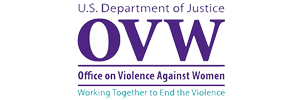 |
 |
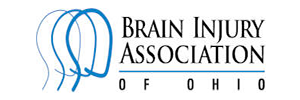 |
 |
 |
 |
Founder and Director
 Rachel Ramirez
Rachel Ramirez
After working in the domestic violence movement for over a decade, Rachel created the Center on Partner-Inflicted Brain Injury to raise awareness and provide leadership on the unidentified and unaddressed public health crisis of brain injury caused by violence. In her 14 years at ODVN, Rachel has been supporting domestic violence programs in implementing trauma-informed approaches as well as providing training, technical assistance, and creating resources for professionals working with domestic violence victims on a wide variety of topics. Rachel is a bilingual licensed independent social worker and registered advocate with senior standing in Ohio.
Contact Us
If you have any questions or would like additional information contact the Founder and Director Rachel Ramirez at RachelR@odvn.org.
Get in touch. Get involved.
174 E Long Street #200 Columbus, OH 43215
1.800.934.9840
614.781.9651
